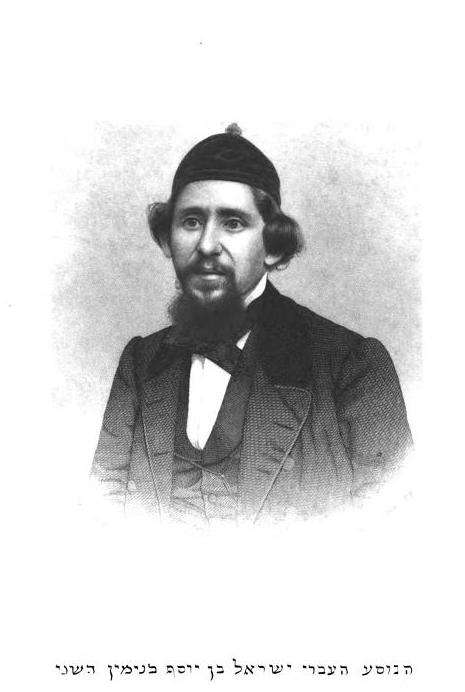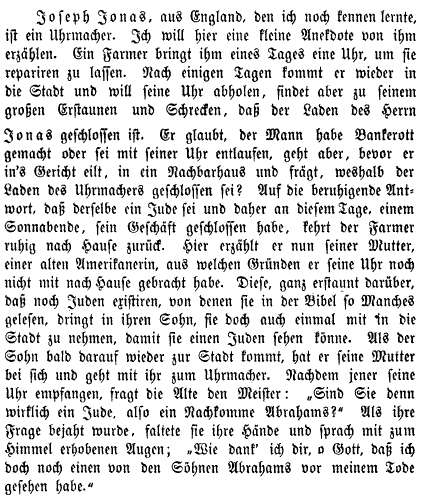
Although there are many interesting things in his books, and they can generate many posts, I just want to call attention to something interesting. On page 349-50 of Drei Jahre, where he is discussing the Jews of Cincinnati, he writes the following:

First a preface. The story concerns Joseph Jonas (1792?-1869), who was literally the first Jew to settle in Cincinnati, way back in 1816. In the early 1860s when Benjamin was writing, there was a community of some 5 or 6000.
"I got to meet Joseph Jonas, born in England, who is a watchmaker. I will relate an anecdote about him. A farmer brought him his watch to repair. A few days later he came to pick it up and to his surprise and consternation, Jonas' shop was closed. He thought that the watchmaker had gone bankrupt or disappeared with his watch. But before going to court he went to a neighbor and asked him why the watchmaker was closed. Being told that the watchmaker was Jewish and that the store was closed because the day was Saturday, the farmer went home with his mind put at ease. Once home, he told his mother, an old American woman, why he didn't bring his watch back. She was very surprised to learn there were still Jews in the world, of whom she read so much about in the Bible. She asked her son to take her back to the city when he went so she could see the Jew. When the son went back, he took his mother along, and they went to the watchmaker together. After the farmer got his watch back, the mother asked him: "Are you actually a Jew - a descendant of Abraham?" When Jonas answered that he was, she folded her hand (in a posture of prayer) and lifted her eyes skyward and said "How can I thank you, Lord, that I have lived to see one of the descendants of Abraham before I die!"Crazy story, huh?
Assuming Jonas told Benjamin this himself, there is another version of the story - or maybe it's an entirely separate incident, which Jonas's own daughter told David Philipson, who published an article in 1900 in the PAJHS 8 (1900) called 'The Jewish Pioneers of the Ohio Valley."
Philipson writes: "In reply to a request for incidents in the life of this pioneer (=Joseph Jonas), addressed to his daughter, Mrs. Annie J. Moses, now living in New York City, I have received quite a lengthy communication containing a number of interesting facts not heretofore published. Referring to the arrival of her father in the metropolis of Ohio Valley, Mrs. Moses writes, "he was known and respected as an Israelite from the first day he entered the town, made many warm friends among other denominations and was upon the msot intimate terms with them throughout his life. He was quite a curiosity at first, being the first Jew seen by many ; their ideas being rather peculiar concerning them. They came from various parts of the country to see him, and one old Quakeress said, 'art thou a Jew ? Thou art one of God's chosen people. Wilt thou let me examine thee?' She turned him round and round and at last excalimed, 'well, thou art no different to other people.'"
For those who didn't realize, the thee-thou-art speech is probably a fairly good paraphrase of authentic Quaker plain speech.
Here is a picture of Joseph Jonas:

Much of the known biographical information concerning Joseph Jonas the watchmaker, first Jew in Cincinnati comes from his own pen. In 1843 he wrote a sketch of Cincinnati Jewry for the Occident (published by Isaac Leeser) and included some details about himself (writing in the third person). You can read it here.
Here is a fascinating paragraph from his article:
On the 24th of April, 1842, a number of ladies of the congregation met at the vestry-room, and commenced the establishment of a Sunday School, nominating Mrs. Louisa Symonds their first superintendent. Some time after, finding it interfered with other duties, she resigned her office, when, by a unanimous vote of the teachers, Mr. Joseph Jonas was requested to superintend the school, which since then has been under his direction. There were forty-six children in attendance, and still every appearance of increasing: the field is large, and the harvest has every appearance of being abundant. Considerable proficiency has been made by the children; but a blight appears to be moving over our prospects, from a source little to be expected—the Rabbonim! who ought to be the promoters, not the disturbers of a plan to forward the principles of our Holy Religion in the minds of youth; but perceiving that good might be done without their interference, the craft was in danger! and the school must be put down. It was consequently anathematized by them, for being held on Sundays! In consequence, the school is not increasing, and through their influence most of the German, and some English children, are prevented attending. The leader amongst these bigoted mischief-makers is Rabbi ****** ******, a Talmid, or scholar of the Rev. Mr. R— of B—. I am well convinced that righteousness and true religion must prevail, and that the evil spirit of bigotry will be overwhelmed. We have endeavoured to reason and compromise with them, but to no purpose. Still whilst there are ten children in attendance, their teachers will not weary in superintending, knowing the benefits already done; we feel warm in the cause of the rising generation, and hope that this publication, sanctioned by some remarks in your useful periodical, may have some influence on their future conduct.As you can see, the newly formed Sunday-school — the entirety of Jewish education which existed there at the time — was opposed by "the Rabbonim," the leader of whom is the unnamed "Rabbi ****** ******, a Talmid, or scholar of the Rev. Mr. R— of B—." We can say with certainty, at least, that the Rev. Mr. R— of B— is Rabbi Abraham Rice of Baltimore. Doubtlessly it was opposed as a Reformist innovation. Jonas, for his part, cannot believe that they would oppose this.
Incidentally, Jonas writes elsewhere that reforms in his synagogue consisted of men and women singing various parts of the service together. At a later date a more conservative element did away with this, but parts are still sung. To think, there was a time when singing אין כאלהינו and such went against custom and was therefore a modern innovation.
The original founders of our congregation were principally from Great Britain, and consequently their mode of worship was after the manner of the Polish and German Jews; but being all young people they were not so prejudiced in favour of old customs as more elderly people might have been, and especially as several of their wives had been brought up in Portuguese congregations. We therefore introduced considerable chorus singing into our worship, in which we were joined by the sweet voices of the fair daughters of Zion, and our Friday evening service was as well attended for many years as the Sabbath morning. At length, however, large emigrations of our German brethren settled amongst us; again our old customs have conquered, and the sweet voices of our ladies are seldom heard; but we have so far prevailed as to continue to this day, the following beautiful melodies, the 29th Psalm, מזמור לדוד, which is chaunted as the procession slowly proceeds to deposit the Sepher Torah (Book of the Law) in the ark; also the אין כאלהינו and after the service is concluded none attempt to quit their seats until the beautiful hymn אדון עולם "Universal Lord! who the sceptre swayed," is finished, being sung by all the congregation in full chorus.





She turned him round and round and at last excalimed, 'well, thou art no different to other people.'"
ReplyDeleteDo you think she was looking for horns?
Considerable proficiency has been made by the children; but a blight appears to be moving over our prospects, from a source little to be expected—the Rabbonim! who ought to be the promoters, not the disturbers of a plan to forward the principles of our Holy Religion in the minds of youth; but perceiving that good might be done without their interference, the craft was in danger! and the school must be put down.
ReplyDeleteAlas, I recently lived in a town where the parents were working hard to establish a Jewish Day School, only to have the efforts sabotaged by the Rabbonim of the town. The reason in that situation was power and money.
>Do you think she was looking for horns?
ReplyDeleteI doubt it. I get the impression she was looking for majesty and glory. Not literally - but she obviously had formed an idealized image of the famous Chosen People of the Seed of Abraham whom she could not imagine still existed. Instead she saw . . . a guy.
Here's an excerpt from an account that a great-uncle of mine wrote about his grandfather, Schachne Isaacs, who came to America in about 1856:
ReplyDeleteHe moved to Darrtown, near Cincinnati, and opened a general store. The fact that the Sabbath was the shopping day for the farmers in the vicinity did not create a problem for Schachne. On that day the store remained closed. Gradually the farmers learned that it paid to make a special trip during the week. In the early days there was much shoddy material on the market but in this general store honest value was given. The admiration for Schachne’s uncompromising religious principles and the quality of his merchandise ultimately led to a complete change of the buying habits of the community. Subsequently Schachne moved to Cincinnati where he entered the wholesale dry goods business under the name of S. Isaacs and Sons.